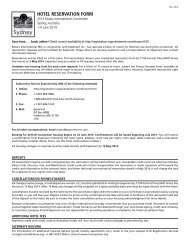DISCURSOS - Rotary International
DISCURSOS - Rotary International
DISCURSOS - Rotary International
Create successful ePaper yourself
Turn your PDF publications into a flip-book with our unique Google optimized e-Paper software.
ealized it had been concern for my safety that had led me to believe in a seemingly undesirable<br />
quantity. I dug deep to find the genesis of the beliefs that had excluded this man from my circle<br />
of acceptables. It is a journey we must all take, ideally without the push of a precarious situation.<br />
It is a journey that will serve us well as we seek to truly serve.<br />
When I was invited to join the <strong>Rotary</strong> Club of Duarte, California, USA, which was at the time engaged<br />
in a court struggle over the admission of women, I learned about the place to which many<br />
women were relegated, in the minds of men and women! We received a few gender-related,<br />
unpleasant telephone calls, and I found myself wondering anew about the deep-seated beliefs<br />
that were leading many to reject the idea that women could be capable Rotarians. Had we looked<br />
around, we would have seen, as Past RI President Majiyagbe described it, women working alongside<br />
men in almost every area of employment, as physicians, professors, engineers, construction<br />
workers, business executives. When the first <strong>Rotary</strong> bylaws were written, they specified that<br />
Rotarians should be “persons of integrity.” In the ensuing years, when the workplace was largely<br />
populated by men, that somehow morphed into “men of integrity.”<br />
What, then, was the genesis of that belief — the belief that women were not worthy of, or capable<br />
of, being Rotarians and working to provide the same humanitarian assistance that men were<br />
providing? It may not even have been a relegation of women to a place of lesser importance and<br />
value but, I would like to believe, a feeling that women could not and would not do the heavy<br />
work that needed to be done. Or, more likely, it may have been that some men were so invested<br />
in the valor of their commitment to <strong>Rotary</strong> that they did not want to share it with women.<br />
Either way, the result is that a part of our society excluded, without good reason, another part.<br />
Within our classification system we can find people of every race, color, creed, ethnic origin, and<br />
gender. Our most important requirement is that persons we invite to serve be “persons of integrity.”<br />
We have learned from the presence of women in <strong>Rotary</strong> that they are capable of adding<br />
much to our ability to serve. They can and do work alongside men, bringing their mystique to the<br />
boardrooms, the work trenches, the financial negotiations, and all of the jobs that they have been<br />
so successful at for the past 25 years.<br />
Yes, there is a gender perspective, but it is not a conflict-producing perspective. Susan B. Anthony<br />
said, “The day will come when man will recognize woman as his peer, not only at the fireside but<br />
in the councils of the nations. Then, and not until then, will there be the perfect comradeship, the<br />
ideal union between the sexes, that shall result in the highest development of the race.”<br />
We need to take time to look deep inside ourselves to find where our biases originate and how<br />
we extinguish them. Younger generations are more accepting because we have taught them —<br />
even if we don’t practice it ourselves — that there is a common humanity, whose generosity is<br />
not segmented by race, creed, color, gender, age, or sexual orientation. At a recent institute with<br />
a younger generations theme, they called their presentation “<strong>Rotary</strong> — Refresh.” Are we there<br />
yet?<br />
And what about ethnic diversity? Margaret Mead, the renowned anthropologist, said, “If we are<br />
to achieve a richer culture, rich in contrasting values, we must recognize the whole gamut of human<br />
potentialities, and so weave a less arbitrary social fabric, one in which each diverse gift will<br />
find a fitting place.” In many countries, we have a de facto segregation of races, yet in many we<br />
do not, and still <strong>Rotary</strong> meetings seem to be populated by individuals more alike than diverse. As<br />
we grow new generations used to sharing their space with people of different colors, different<br />
genders, and different sexual persuasions, we can expect to see not just a tolerance for, but a<br />
spirit of inclusion toward, people of different backgrounds, whose common goal is Service Above<br />
Self — a <strong>Rotary</strong> refreshed!<br />
Chilean writer Isabel Allende said, “Peace requires everyone to be in the circle — each one to<br />
contribute to its wholeness, inclusion.” Mahnaz Afkhami, a lifelong advocate of human rights,<br />
6 <strong>International</strong> Assembly Speeches 2013


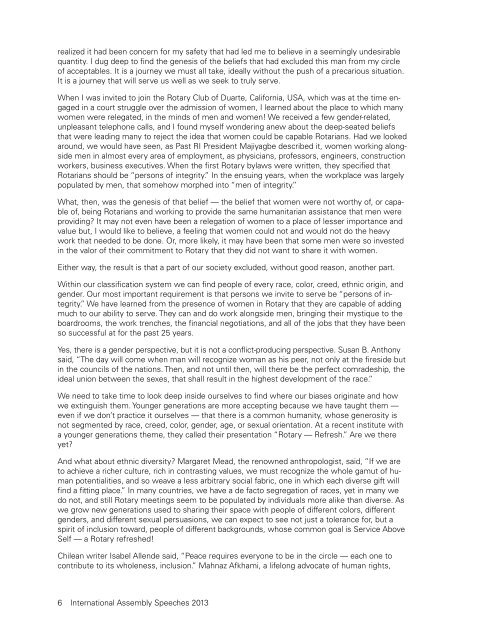
![La présidence du club [222-FR] - Rotary International](https://img.yumpu.com/25855726/1/190x245/la-presidence-du-club-222-fr-rotary-international.jpg?quality=85)
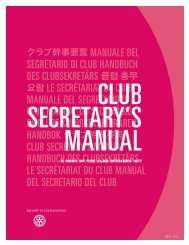

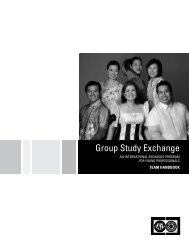

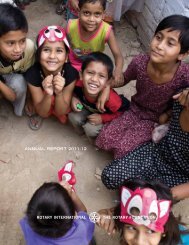

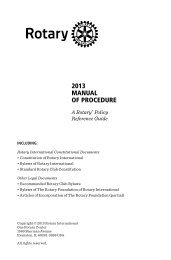


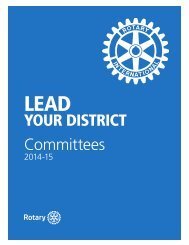
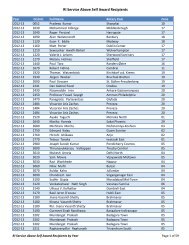
![La conférence de district [800-FR] - Rotary International](https://img.yumpu.com/25855636/1/190x245/la-conference-de-district-800-fr-rotary-international.jpg?quality=85)
